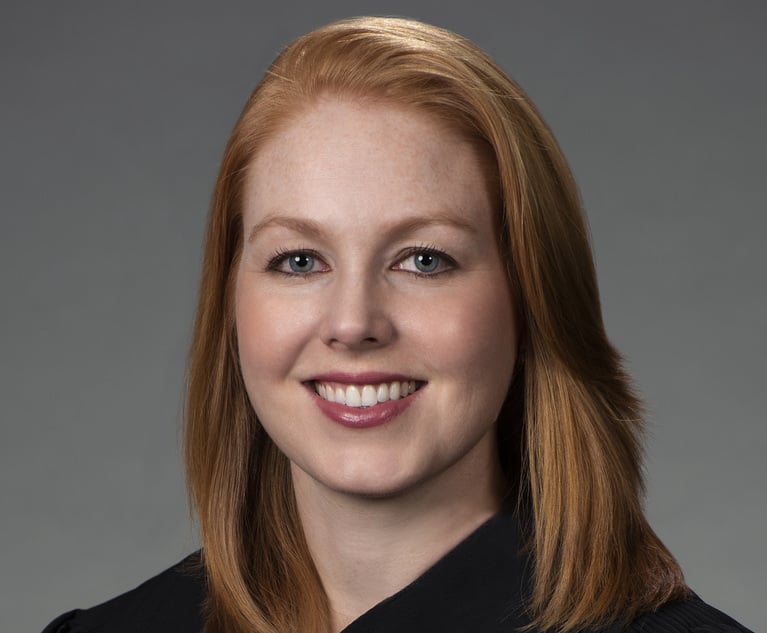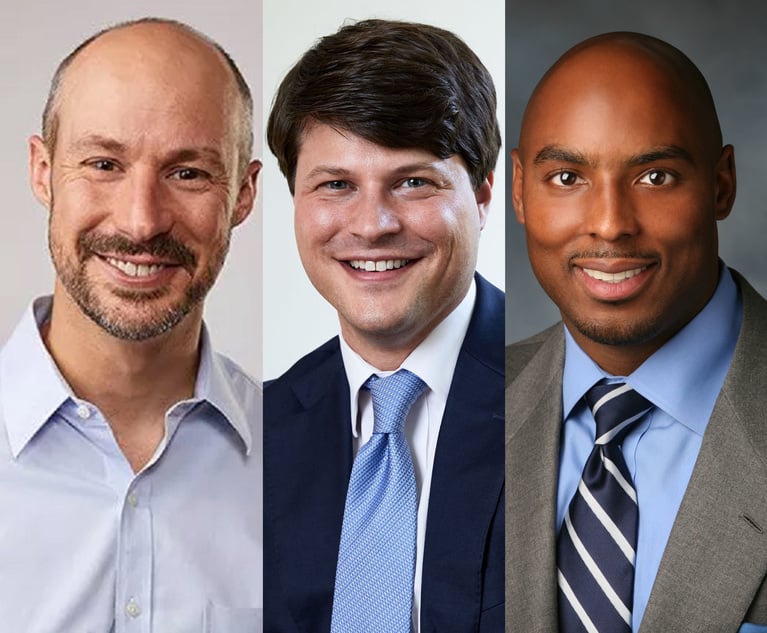Plaintiffs Lawyers Are Skeptical of COVID-19 Med-Mal Cases, but Katrina Showed Risks for Hospitals
Lawmakers may also weigh in, as doctors' insurers and plaintiffs lawyers say they are each working on legislation to protect health care providers from claims stemming from the COVID-19 crisis. Where these adversaries draw the line remains to be seen.
April 02, 2020 at 01:10 PM
7 minute read
 (Photo: : gpointstudio/Shutterstock.com)
(Photo: : gpointstudio/Shutterstock.com)
One side effect of a career writing about the legal system is that I imagine potential lawsuits everywhere: Spilled juice at the grocery store, a driver texting on the highway and, most recently, the specter of overwhelmed and undersupplied health care providers treating waves of COVID-19 patients.
Georgia lawyers who've won big medical malpractice verdicts said such a worst case scenario actually would make it difficult for plaintiffs to prevail. That's because the "standard of care" that is compared with the treatment a patient received depends on the circumstances facing the doctors and nurses at the time of the treatment.
Robin Frazer Clark, an Atlanta plaintiffs lawyer, noted that in most cases, "standard of care" is considered on a national basis, but COVID-19 cases would likely require a local standard of care, given the different supplies available in each area of the country. "For any normal scenario my guess is that most hospitals have the appropriate number of ventilators given the statistics of needing them for a normal situation," she said. "A global pandemic is not normal."
However, hospitals in other disaster areas, such as New Orleans in the wake of Hurricane Katrina, faced claims that they were inadequately prepared for the situation, and cases like those could occur again.
Lawmakers may also weigh in. Representatives of a big Georgia insurer of health care providers and the state's plaintiffs lawyers suggested that they are each working on legislation to protect health care providers from claims stemming from the COVID-19 crisis. Where each draws the line remains to be seen, and their comments revealed the tension between these natural adversaries.
"I can't imagine being able to (or even wanting to) bring a successful claim for med mal regarding COVID-19," said Clark, who last year won a $2.3 million verdict on claims that doctors and a hospital were at fault for inserting a breathing tube that damaged a woman's vocal cords, leading to pneumonia blamed for her death more than a month later.
"To prove negligence in a medical case, you must have expert testimony that the care given to the patient fell below the standard of care," she wrote. "'Standard of care' is defined as what reasonably prudent doctors would do in like or similar conditions. … Has there been any 'like or similar condition?' I doubt it. Maybe during the plague, but not in modern times."
Clark added that people are dying of COVID-19 even with intense treatment by health care workers, so proving their death was caused by any alleged negligence by the doctors or nurses would be difficult.
Finally, Clark pointed out that med-mal complaints must include a supporting affidavit from another physician "who has treated numerous patients under these same conditions who is willing to swear under oath that what the doctor did to a COVID-19 patient deviated from the [standard of care] and caused the person's death. What doctor would ever agree to sign that affidavit? Probably none."
'Inadequately Prepared' Hospitals?
Donald Palmisano, the executive director of the Medical Association of Georgia, represented doctors and hospitals in private practice in New Orleans in the years before Hurricane Katrina in 2005. He recalled volunteer doctors being protected from suits by Good Samaritan laws, but he said some hospitals that lost electricity and suffered other problems were sued for being "inadequately prepared."
"Some settled, and some went away," he said of the cases, but he said that type of case concerns him as a way plaintiffs might try to get around the standard of care and other hurdles in traditional med-mal cases.
Palmisano said his organization is advocating for eased restrictions on telemedicine, helping doctors understand the small business loans aspects in the federal relief legislation and working with its medical reserve corps.
Paul Weathington, a frequent victor for health care providers facing malpractice cases, said, "In terms of med-mal cases, I understand that some safe harbor may exist or be enacted."
"With that said, I am certain that there will be some medical events that result in potential claims. … I must think that suits brought over care while the system is overrun would be met unfavorably by juries, but we shall see."
Adam Malone, a longtime medical-malpractice plaintiffs lawyer, said juries often are sympathetic to doctors–and he is, too.
"It seems even in bad taste" to discuss claims against doctors and nurses he compares to front-line soldiers in a war. "That's where my mind is."
Malone said the standard of care would depend on the circumstances facing the health care providers, adding he could envision juries understanding a case against a "rogue" doctor or hospital that put their interests above those of their patients.
But, he concluded, "I wouldn't envy the lawyer who sues a national hero."
Legislative Options?
Stephanie Kindregan, the director of government affairs for MagMutual, an insurer for health care providers, said, "What we are seeing is an amazing example of how physicians and health care workers put their oath into practice and their patients above themselves. We are, as always, telling them to do what they think is right and rely on us to protect them from any legal fallout."
"When COVID-19 passes, it would be wonderful to believe that we would all remember the sacrifice and heroics of the health care community in the face of overwhelming challenges. Unfortunately, our experience has always been that where plaintiff lawyers can make money from tragedy, they will try to. Our hope is that juries will remember what really happened, but in case they don't we will be supporting legislation and action by Governor Kemp to better protect our policyholders."
Dan Snipes, president of the Georgia Trial Lawyers Association, said the his organization "has been working with our elected officials to make sure that medical providers feel secure as they treat persons affected by the pandemic."
Snipes echoed comments from Clark and Malone about the standard of care depending on the circumstances. But he added, "In the unique environment that surrounds this pandemic and the accompanying uncertainty, this legal definition may not provide sufficient peace of mind. GTLA is working to make sure that medical providers who are treating COVID-19 patients are protected from litigation for all but the most serious and senseless negligence."
"The lawyers who represent the victims of negligence are not looking for anything other than helping Georgia's elected leaders to navigate this perilous situation," Snipes added. "Once Governor Kemp declared a public health state of emergency, GTLA has been working to make sure that the unique circumstances surrounding this pandemic are properly considered when evaluating the care provided by the medical community."
He added, "we have been working on legislation to provide protection for volunteers and medical providers who are caring for those with COVID-19. We have drafted proposed legislation and have reached out to the governor and legislative leaders in this effort. This is no time for politics and it is unfortunate that Ms. Kindregan would choose this opportunity to make inaccurate and inflammatory statements about our members. Our civil justice system and the 7th Amendment are important to all citizens of this state, and should not be the subject of such mudslinging. Nevertheless, we will continue to work with our governmental leaders—and the medical community—to come up with solutions to help during this crisis. "
This content has been archived. It is available through our partners, LexisNexis® and Bloomberg Law.
To view this content, please continue to their sites.
Not a Lexis Subscriber?
Subscribe Now
Not a Bloomberg Law Subscriber?
Subscribe Now
NOT FOR REPRINT
© 2025 ALM Global, LLC, All Rights Reserved. Request academic re-use from www.copyright.com. All other uses, submit a request to [email protected]. For more information visit Asset & Logo Licensing.
You Might Like
View All
Justice Known for Asking 'Tough Questions' Resolves to Improve Civility
4 minute read
Trending Stories
- 1Can a Law Firm Institutionalize Its Culture? Boies Schiller’s New Chairman Will Try
- 2Full 8th Circuit Hears First Amendment Challenge to School District’s ‘Equity Training’
- 3Exploring Generative AI’s Impact on Intellectual Property
- 4Training Lawyers in AI and Using AI to Boost Training
- 5EB-5 Rebounds After a Rocky Year: Challenges of 2024 Lay Groundwork for a Booming 2025
Who Got The Work
J. Brugh Lower of Gibbons has entered an appearance for industrial equipment supplier Devco Corporation in a pending trademark infringement lawsuit. The suit, accusing the defendant of selling knock-off Graco products, was filed Dec. 18 in New Jersey District Court by Rivkin Radler on behalf of Graco Inc. and Graco Minnesota. The case, assigned to U.S. District Judge Zahid N. Quraishi, is 3:24-cv-11294, Graco Inc. et al v. Devco Corporation.
Who Got The Work
Rebecca Maller-Stein and Kent A. Yalowitz of Arnold & Porter Kaye Scholer have entered their appearances for Hanaco Venture Capital and its executives, Lior Prosor and David Frankel, in a pending securities lawsuit. The action, filed on Dec. 24 in New York Southern District Court by Zell, Aron & Co. on behalf of Goldeneye Advisors, accuses the defendants of negligently and fraudulently managing the plaintiff's $1 million investment. The case, assigned to U.S. District Judge Vernon S. Broderick, is 1:24-cv-09918, Goldeneye Advisors, LLC v. Hanaco Venture Capital, Ltd. et al.
Who Got The Work
Attorneys from A&O Shearman has stepped in as defense counsel for Toronto-Dominion Bank and other defendants in a pending securities class action. The suit, filed Dec. 11 in New York Southern District Court by Bleichmar Fonti & Auld, accuses the defendants of concealing the bank's 'pervasive' deficiencies in regards to its compliance with the Bank Secrecy Act and the quality of its anti-money laundering controls. The case, assigned to U.S. District Judge Arun Subramanian, is 1:24-cv-09445, Gonzalez v. The Toronto-Dominion Bank et al.
Who Got The Work
Crown Castle International, a Pennsylvania company providing shared communications infrastructure, has turned to Luke D. Wolf of Gordon Rees Scully Mansukhani to fend off a pending breach-of-contract lawsuit. The court action, filed Nov. 25 in Michigan Eastern District Court by Hooper Hathaway PC on behalf of The Town Residences LLC, accuses Crown Castle of failing to transfer approximately $30,000 in utility payments from T-Mobile in breach of a roof-top lease and assignment agreement. The case, assigned to U.S. District Judge Susan K. Declercq, is 2:24-cv-13131, The Town Residences LLC v. T-Mobile US, Inc. et al.
Who Got The Work
Wilfred P. Coronato and Daniel M. Schwartz of McCarter & English have stepped in as defense counsel to Electrolux Home Products Inc. in a pending product liability lawsuit. The court action, filed Nov. 26 in New York Eastern District Court by Poulos Lopiccolo PC and Nagel Rice LLP on behalf of David Stern, alleges that the defendant's refrigerators’ drawers and shelving repeatedly break and fall apart within months after purchase. The case, assigned to U.S. District Judge Joan M. Azrack, is 2:24-cv-08204, Stern v. Electrolux Home Products, Inc.
Featured Firms
Law Offices of Gary Martin Hays & Associates, P.C.
(470) 294-1674
Law Offices of Mark E. Salomone
(857) 444-6468
Smith & Hassler
(713) 739-1250








